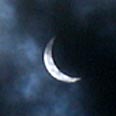
Is there a place where Palestinians and Jews can look to find answers to their unending conflict?
One answer is to look to the stars.
Now, I’m not a big believer in Horoscopes, short paragraphs written by “psychics” of sorts who interpret the alignment of planets and stars to explain how people born on certain dates may or may not act.
When I was younger and the most popular astrologer was a writer named “Omar,” I did follow his writings because he was the only journalist when I was growing up who had an Arab name.
The American news media is so biased that it took generations for Arabs to be allowed into the exclusive club of the Fourth Estate. So when you come across a journalist named “Omar,” you read his writings even if they dwell on things like finding a wife, or losing weight.
Palestinians and Israelis all pray to the Heavens for answers. So far, we haven’t seen any good answers. But maybe, we are looking too far. Maybe we should be looking towards the moon?
When you think about it, the moon doesn’t just have a tremendous impact on Earth, tugging on our oceans with its gravity pull to keep our planet from spinning out of control. The moon has a tremendous impact on our individual lives, too, as Jews, Christians and Muslims.
Every year, I hear my wife Alison ask her father the same question: “Dad, can you quit calling the FBI and turning in my husband? The credit card refuses to cover his bond any more.”
Wrong question. Actually, the one I hear her ask with lesser frequency is, "Tatti, when is Chanukah this year?" Her father wisely replies, "The same day it always is. The 25th of Kislev."
Of course, he always lectures me, “If you can’t say something nice, say it in Yiddish.”
The truth is, although Palestinians and Israelis live in a modern world, the ancient world still impacts our lives, starting with the calendar.
Clearly, we can’t have a religious celebration or religious event without first looking up and fixating on the moon, which, because of its nature, changes shape every day - every 29.5 days, to be precise, or 13 times a year.
We move from a crescent moon to a full moon. Sometimes, the shadow of the earth from the sun’s light casts itself onto the moon, causing a creeping and creepy lunar eclipse.
We just had a lunar eclipse. Most Palestinians and Israelis probably didn’t even notice the event, too busy throwing rocks and lobbing bombs at each other.
But a few of us put down our stones and Qassem rockets to go outside as the moon was being eclipsed. They carried pots and pans that they clapped together to create a loud noise to frighten away the bad spirits.
I always thought that if you believed in the One God – Jew, Christian or Muslim – you didn’t have to worry about the Jin, or the evil-doers. I’m referring to the spiritual evil-doers, not the political ones President George Bush is so fond of citing every time he is about to start a military conflict.
That’s because the moon does play an important part in our lives.
For example, without the moon, we wouldn’t know when to celebrate our religious holidays, which change dates from year to year.
When does Ramadan begin? As soon as a faithful Muslim first sights the crescent moon.
When is Passover? Got to check the moon.
This year, traditional Western Easter was celebrated on April 16, while the Orthodox Christians who rely on the Julian Calendar, which is based on the moon, celebrated it one week later. It’s also tied to Passover.
It’s the same for the Orthodox Christmas, too.
Priests and Rabbis and Imams use complex algorithms to determine the precise dates in the contemporary calendar, which constantly change because of the switch from the Gregorian to Julian calendars sometime in the 16th Century.
The whole problem of date conflicts has its ups and its downs, especially for me as an Orthodox Christian living in America.
Once Americans finish celebrating Christmas or Easter, the stores put all the holiday decorations, candy and baskets on sale. I can save mucho moolah waiting until the
American holidays are past to buy my Christmas and Easter decorations. Any time you save money because of your religion, that is a good thing, although to most Americans, the holidays are all about commercialism and making money.
There is a down side that not even saving money can comfort, especially for people of the Middle East.
I mean, there are only two people who I know who are influenced by the phases of the moon.
The werewolf, whose frightening transformation occurs 13 times a year from a mortal man into a vicious monster, in, coincidentally, much the same way that Palestinian and Israeli negotiators often transform, too, from lovers of peace to cruel terrorists.
And, my wife.
Regardless of how loving and caring she is, I know there are a few days each month I had better stay out of her way, or pay the steep consequences.
It’s just a fact of life, I guess.
(Ray Hanania is an award winning Palestinian American journalist, author and standup comedian. He can be reached at www.hanania.com .)















